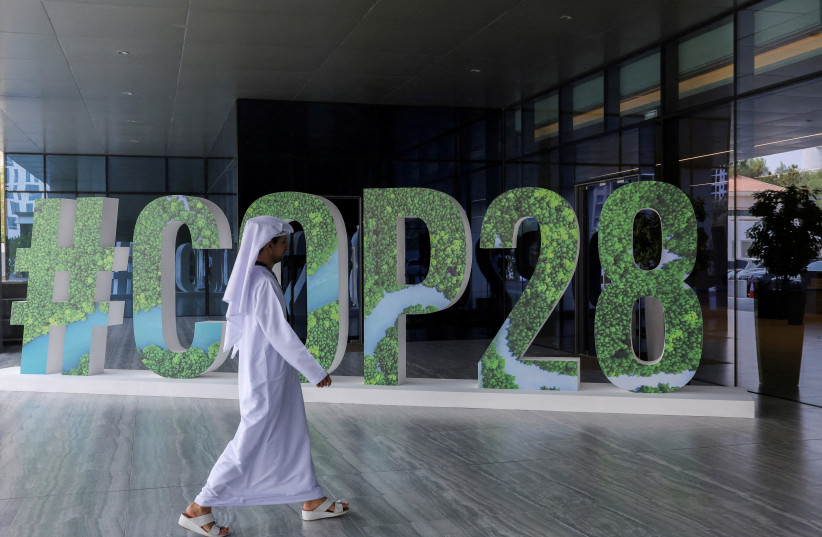After proclaiming 2023 to be the year that Israel tackled the climate crisis, the country is set to dispatch a notably small delegation to COP28, scheduled to commence on November 29.
According to the Foreign Ministry's Maya Kadosh, national coordinator for COP28, only around 20 professionals from the Foreign, Environmental Protection, Energy and Economy ministries will join the official delegation. There is speculation that President Isaac Herzog will fly into Dubai for the first two days of the conference, when other presidents and prime ministers generally attend, although his office would not confirm.

Israeli delegation reduced to 15<br><br><br><br><br><br><br><br><br><br>
Israel will still erect a pavilion in the Blue Zone. However, it will be much smaller than initially planned. Rather than host 30 companies collaborating with the Israeli Innovation Authority, four climate-tech companies from the Gaza periphery will accompany the official delegation. The team was initially supposed to put on as many as 80 events. Kadosh said that number has been reduced to 15. In addition, the COP28 budget was set to be NIS 9 million. Behar said the country is now spending a fraction of the amount.
Moreover, in the Israeli pavilion, there will be a particular corner dedicated to Israel's hostages in Gaza.
"There is a terrible situation now, and people are afraid to go [abroad]," Kadosh told The Jerusalem Post.
Earlier this month, Israel warned its citizens against traveling abroad due to an increase in antisemitic incidents and violent attacks against Israelis and Jews worldwide. The country specifically cautioned against travel to Arab countries, including those with which Israel has peace agreements, like the United Arab Emirates.
"People are also in the [IDF] reserves, were harmed personally, lost family and friends," Kadosh continued. "We are going with a heavy heart."
Just before the October 7 Hamas massacre, Israel had announced an impressive list of climate-tech companies that would travel to Dubai. Environmental Protection Minister Idit Silman had touted that the country would pass a climate law before the start of COP28; the climate bill had finally made it through the Ministerial Committee on Legislation to bring it to the Knesset after its holiday break.
Moreover, there were great aspirations for regional collaborations, some of which Kadosh said were likely lost on October 7.
"At COP28, there were supposed to be many joint events and agreements signed for the region that are not happening now," Kadosh admitted. "But hopefully, they are just pushed off and will not disappear.
"Those who want to keep the Abraham Accords are keeping up their relations, and we are optimistic that the warmth between us can return," Kadosh said. "We are all sitting in a climate hot spot, lacking water, and there will still be a need for collaboration the day after."
She said that Dubai was eager to have Israeli participation at COP28 despite the ongoing war with Hamas in Gaza and helped the delegation both in terms of last-minute changes it had to make and helping to ensure its security.
In addition, she said that she does not believe that Israel will forget about its climate agenda but delay it.
"In 2024, when things calm down, we will continue to push to meet our goals," Kadosh said, reducing greenhouse gasses by nearly 30% by 2030 and becoming Net Zero by 2050.
Regarding Israel's global impact, Behar said that the need for climate solutions is growing, with recent reports indicating the world is heading to global warming of 2.8 degrees Celsius by the end of the century, which could be catastrophic to humans and the planet.
"People, governments, and companies around the world are looking for practical solutions to the climate crisis, and Israel is situated in the best place with the best solutions to mitigate [climate change], help reduce greenhouse gases, and also to adapt to climate change," Behar said. "The Israeli water model is a wonderful example of how to use water in an efficient way, get more from every drop, reduce emissions, and reduce pollution. If you look at agriculture, Israel offers many possibilities to grow more with less, grow in arid or semi-arid regions, and reduce the impact of agriculture on the environment and the climate."
And he said that despite rising anti-Zionism, "the interest in cooperation with Israel is there and is growing."
Behar and Kadosh said they are confident Israel will have a strong showing at COP29, slated to take place in Eastern Europe.
Relatedly, inside Israel, Kadosh said there is a growing movement to rebuild southern Israel's sustainability, perhaps making the area a national model.
"This is something that the residents are already really talking about," Kadosh said. "Sustainability was already an important value to many of the residents, and from this tragedy, there may be a unique opportunity."
The Environment and Climate Change portal is produced in cooperation with the Goldman Sonnenfeldt School of Sustainability and Climate Change at Ben-Gurion University of the Negev. The Jerusalem Post maintains all editorial decisions related to the content.
